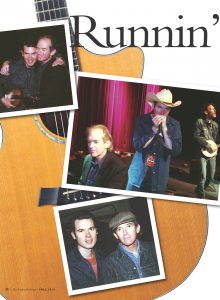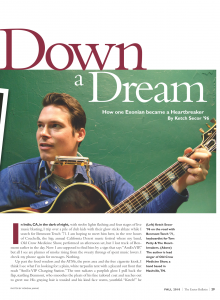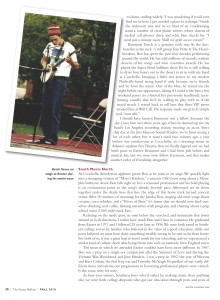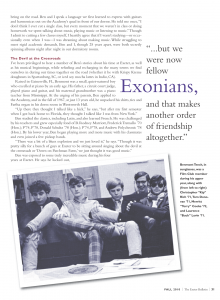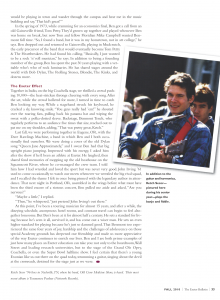Runnin' Down a Dream
By Ketch Secor
The Exeter Bulletin - Fall 2010
How one Exonian became a Heartbreaker
In Indio, CA, in the dark of night, with strobe lights flashing and four stages of live music blasting, I trip over a pile of club kids with their glow sticks ablaze while I search for Benmont Tench '71. I am hoping to meet him here, in the wee hours of Coachella, the hip, annual California Desert music festival where my band, Old Crow Medicine Show, performed an afternoon set, but I lost track of Benmont earlier in the day. Now I am supposed to find him by a sign that says "AmEx VIP," but all I see are plumes of smoke rising from the sweaty throngs of spent music lovers. I check my phone again for messages. Nothing.
Up past the food vendors and the ATMS, the press area and the free cigarette kiosk, I think I see what I'm looking for: a plain, white tarpaulin tent with a placard out front that reads "AmEx VIP Charging Station." The tent radiates a purplish glow. I pull back the flap, startling Benmont, who smoothes the pleats of his fine tailored coat and reaches out to greeet me. His graying hair is tousled and his kind face warm, youthful. "Ketch!" he exclaims, smiling widely. "I was wondering if you'd ever find me in here. I just needed a place to recharge." Inside the iridescent tent and its icy blast of air conditioning stand a number of clear plastic towers where dozens of stacked cell phones chirp and whir. Ben checks his. "I need just a minute more. Shall we grab an ice cream?"
Benmont Tench is a genuine rock star. As the keyboardist in the rock 'n' roll group Tom Petty & The Heartbreakers, Ben has spent the past four decades performing around the world. He has sold millions of records, written dozens of hit songs and won countless awards. He has played the Super Bowl halftime show. Yet he is still willing to drive four hours out to the desert to sit in with my band at Coachella, bringing a little star power to my modest Nashville-based string band if only because we're friends and he loves the music. Out of the blue, he texted me the night before our appearance, asking if I could score him a few weekend passes (to a festival he's previously headlined), mentioning casually that he'd be willing to play with us if the mood struck. I texted him back to tell him that three VIP passes awaited him at Will Call. His response made he grin. It simply read, "non sibi."
I should have known Benmont was a fellow Exonian the day I met him over three years ago, when he showed up for my band's Los Angeles recording session wearing an ascot. Since that day at the Jim Henson Sound Studios, we've been seeing a lot of each other, but it wasn't until two winters ago, a year before our rendezvous at Coachella, in a dressing room in Atlanta's opulent Fox Theatre, that we finally figured out we had both gone to Exeter. Benmont and I had been pals before, and musical kin, but we were now fellow Exonians, and that makes another order of friendship altogether.
South Meets North
At Coachella, thunderous applause greets Ben as he joins us on stage. We quickly light into a stomping version of "Mary's Kitchen," a raucous Old Crow song about a Memphis barbecue shack. Ben falls right in; he's a seasoned professional and his bold playing is an exclamation point to the song's already feverish pace. Afterward, we sit down together under the shade trees that line the edge of this horse track turned concert venue. After 90 minutes of mooning for the JumboTron, singing old-time songs about cocaine, corn whiskey and a "River of Beer," it's funny that we should now find ourselves drinking iced coffee, fanning ourselves with programs, and chatting about a prep school some 2,500 miles back East.
Relaxing on the sandy grass, an oasis below the scorched, arid mountains that tower around us in all directions, I realize how much Ben and I have in common. He graduated from Exeter in 1971 and I followed 25 years later in 1996. We were both raised in Southern college towns by families who believed in the value of a good education, while our peers believed we must have done something terribly wrong to be sent so far from home. For both of us, it was a great leap to travel north for our schooling, and we experienced a similar kind of culture shock after being thrust into such an intensely New England town.
The times in which we attended Exeter couldn't have been more different. In 1967, Ben was a prep on a single-sex campus just after the Summer of Love and during the Vietnam War, Woodstock and Jimi Hendrix. I was a prep in 1992, the year of Nirvana and Kurt Cobain, the first Iraq war and Timothy McVeigh. Regardless of our vastly different times and talents, our progressions to becoming professional players were virtually the same, note for note.
As four-year seniors, Southern boys who'd rather be making music than anything else, we were both college dropouts who got our education through years and years of being on the road. Ben and I speak a language we first learned to express with guitars and harmonicas out of the Academy's quad in front of our dorms. He told he once, "I don't think I ever cut a single glass, but every moment that we weren't in class or doing homework we spent talking about music, playing music or listening to music." Though I admit to cutting a few classes myself, I heartily agree that if I wasn't studying -- or occasionally even when I was -- I was dreaming about making music. While struggling to meet rigid academic demands, Ben and I, though 25 years apart, were both secretly spinning albums night after night in our dormitory rooms.
The Devil at the Crossroads
I've been privileged to hear a number of Ben's stories about his time at Exeter, as well as his musical beginnings, while refueling and recharging in the many towns we find ourselves in during our times together on the road (whether it be with Krispy Kreme doughnuts in Spartanburg, SC, or iced soy mocha lattes in Indio, CA).
Raised in Gainesville, FL, Benmont was a small, quiet-natured boy who excelled at piano by an early age. His father, a circuit court judge, played piano and guitar, and his maternal grandmother was a piano teacher from Missisippi. At the urging of his parents, Ben applied to the Academy, and in the fall of 1967, at just 13 years old, he unpacked his shirts, ties and Farfisa organ in his dorm room in Wentworth Hall.
"Up there they thought I talked like a hick," he says, "but after my first semester when I got back home to Florida, they thought I talked like I was from New York."
Ben studied the classics, including Latin, and also learned French. He was challenged by his teachers and grew especially fond of B. Rodney Marriot, Frederick Tremallo '70 (Hon.); P'74,P'78, Donald Schultz '78 (Hon.); P'74,P'78, and Andrew Polychronis '78 (Hon.). By his lower year, Ben began playing more and more music with his classmates and even joined a few pickup bands.
"There was a bit of a blues explosion and we just loved it," he says. "Though it was pretty sily for a bunch of guys at Exeter to be sitting around singing about the devil at the crossroads or 'Down on Parchman Farm,' we just thought it was good music."
Ben was exposed to some truly incredible music during his four years at Exeter. He says he lucked out, "staring at Exeter a couple of months before Sgt. Pepper's [the landmark Beatles album] came out. The Grateful Dead had one of their first records, Dylan was legendary and about to put out John Wesley Harding. The Beatles' Magical Mystery Tour, The White Album, 'I Am the Walrus' -- all of those came out while I was at Exeter."
During this same rich chapter in rock 'n' roll musical history, Creedence Clearwater Revival was singing swamp rock and Janis Joplin and Fleetwood Mac had burst onto the scene. "The Stones had put out Beggars Banquet and Let It Bleed, and there was the first Taj Mahal reacord, and of course I was listening to Sleepy John Estes," he adds. For Ben and countless others of his generation, the folk revival had spread the deep, primitive sounds of early and raw blues, bluegrass and old-time music to an entirely new audience of young people. A "greatest generation" of music was being made, much of it in response to the great social upheaval going on across the nation.
Not only were the airwaves crackling with the latest hit sounds on Boston's WBCN, but the soundscape of the entire country was quaking with the latest news reports -- racial rioting in major cities, anti-war demonstrations turned violent, and daily coverage of a grisly war in southeast Asia. Ben recalls the Kent State shootings and the somber day of mourning that followed on Exeter's shutdown campus. There were national moratoriums against the war and though Ben participated in a few campuswide marches, he was more fired up by Led Zeppelin and the MC5 at Boston Garden that he was about Nixon and Kissinger in the Oval Office.
He was playing more in those days and getting much-needed stage time with a handful of Exonian-led bands, including The Myth Mole Blues Band and Hardly Radical & The Apathetics, "sort of a sarcastic proto-punk band," according to Ben. "We were deliberately bad." A number of the bands on campus were formed by a core group of classmates that included Will Magoon '71, Doug Brown '71, Robert Aberg '70, and one Grover Coors '69, who Ben credits with being the first to teach him to improvise.
It was during an Assembly Hall "Battle of the Bands" where Coors chided him for learning the organ solo to The Doors' "Light My Fire" note for note, Ben remembers, "[Grover] said, 'No, no, no! You're supposed to make it up. It's different every night.'" The episode was an "eye-opener" for Ben. This rotating group of student musicians played parties, assemblies, school dances and even had the occasional out-of-town booking. "We'd get hired sometime to go out off campus," he says. "Someone would know someone who was having a prom and would get us to go play. And if we didn't have enough songs, we'd play a slow blues for 20 minutes, probably boring everyone to death, but we were having fun -- and learning."
Becoming a Heartbreaker
In 1971 Benmont graduated from Exeter and went to Tulane University, "figuring there was good music in New Orleans." He thought he could get a few credits and then transfer to Tulane's affiliate school, H. Sophie Newcomb Memorial College, an art college where he hoped to find some similarly minded musicians. "I actually went to college to find the right band to play with," Ben says. He stayed in New Orleans two years, studying at Tulane and practicing piano. He adds, "I was literally walking around hoping someone would be playing in town and wander through the campus and hear me in the music building and say, 'That kid's great!'"
In the spring of 1973, while cramming for an economics final, Ben got a call from an old Gainesville friend, Tom Petty. They'd grown up together and played whenever Ben was home on break, but now Tom and fellow Floridian Mike Campbell wanted Benmont full time. "So, I found a band, but it was in my hometown, not in art college," he says. Ben dropped out and returned to Gainesville, playing in Mudcrutch, the early precursor of the band that would eventually become Tom Petty & The Heartbreakers. He had found his calling. "Basically, I just wanted to be a rock 'n' roll musician," he says. In addition to being a founding member of the group, Ben has spent the past 30 years playing with a veritable who's who of rock luminaries. He has shared stages around the world with Bob Dylan, The Rolling Stones, Blondie, The Kinks, and dozens more.
The Exeter Effect
Together in Indio, on the big Coachella stage, we thrilled a crowd pushing 10,000 -- the heat-striken throngs cheering with every song. After the set, while the crowd hollered for more, I turned in time to catch Ben looking my way. While a stagehand struck his keyboard, he cracked a sly, knowing smile. "You guys really had 'em!" he shouted over the roaring fans, pulling back his panama hat and wiping the sweat with a polka-dotted sleeve. Backstage, Benmont Tench, who regularly performs to an audience five times that size, reached out to pat me on the shoulder, adding, "That was pretty great, Ketch."
Last fall, we were performing together in Eugene, OR, with the Dave Rawlings Machine, a band in which Ben and I both occasionally find ourselves. We were doing a cover of the old Dylan song "Queen Jane Appropriately," and I swear Ben had that big upright piano jumping. Impressed with his energy, I asked him after the show if he'd been an athlete at Exeter. He laughed, then shared fond memories of mopping up the old boathouse on the Squamscott River, where he co-managed the crew team. I told him how I had wrestled and loved the sport but was never very good. John Irving '61 used to come occasionally to watch our meets when we wrestled the big rival squad, and I recalled the shame I felt in once being pinned with the legendary author in attendance. That next night in Portland, OR, assembled in the wings before what must have been the third encore of a riotous concert, Ben pulled me aside and asked, "Are you nervous?"
"Maybe a little," I replied.
"Then," he whispered, "just pretend John Irving's out there."
At this point, I've been a touring musician for almost 15 years, and after a while, the dizzying schedule, anonymous hotel rooms, and constant travel can begin to feel altogether lonesome. But Ben's been at it for almost half a century. He sets a standard for living because he's seen it all, survived it, and has come out a wiser man. He sets an even higher standard for playing because he's just so damned good. That Benmont too experienced the same four years of joy, hardship, and the challenges of adolescence on those special Academy grounds has deepened our friendship and made us more appreciative of the way Exeter continues to enrich our lives. Ben and I are both prime examples of just how many places an Exeter education can take you: not only to the boardroom, Wall Street and leading research universities, but to the stage of the Grand Ole Opry, Coachella, or even the Super Bowl halftime show. I feel certain that there's a young Exonian like us out there on the quad today, strumming a guitar, singing about the devil at the crossroads, destined for the stage, just as we were.

